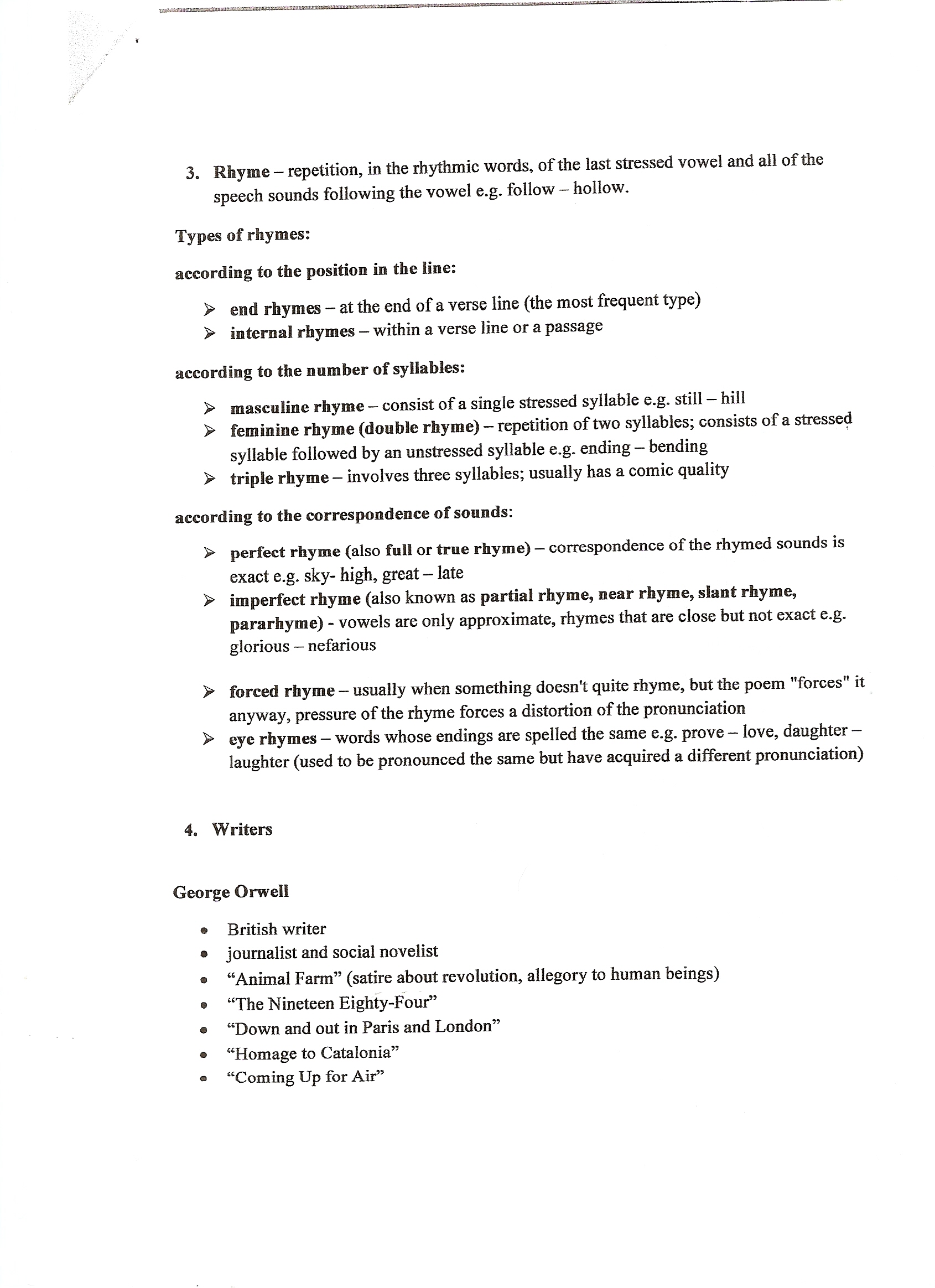3material na test 9 grudzien

3. Rhyme - repetition, in the rhyfhmic words, of the last stressed vowel and all of the speech sounds following the vowel e.g. follow - hollow.
Types of rhymes:
according to the position in the linę:
> end rhymes - at the end of a verse linę (the most frequent type)
> internal rhymes - within a verse linę or a passage
according to the number of syllables:
> mascnline rhyme — consist of a single stressed syllable e.g. still — hill
> feminine rhyme (double rhyme) — repetition of two syllables; consists of a stressed syllable followed by an unstressed syllable e.g. ending - bending
> triple rhyme - involves three syllables; asually has a comic ąuality
according to the correspondence of sounds:
> perfect rhyme (also fuli or true rhyme) — correspondence of the rhymed sounds is exact e.g. sky- high, great - late
> imperfect rhyme (also known as partial rhyme, near rhyme, slant rhyme, pararhyme) - vowels are only approximate, rhymes that are close but not exact e.g. glorious - nefarious
> forced rhyme — usually when something doesnt quite rhyme, but the poem "forces" it anyway, pressure of the rhyme forces a distortion of the pronunciation
> eye rhymes - words whose endings are spelled the same e.g. prove - love, daughter -laughter (used to be pronounced the same but have acquired a different pronunciation)
4. Writers
George Orwell
• British writer
• joumalist and social novelist
• “Animal Farm” (satire about revolution, allegory to human beings)
• “The Nineteen Eighty-Four”
• “Down and out in Paris and London”
• “Homage to Catalonia”
• “Corning Up for Air”
Wyszukiwarka
Podobne podstrony:
2material na test 9 grudzien asy ndeton - deliberate omitting conjunctions from a series of related
Poetry 3 1 POETRY 3 I. The form of poetry - sound values: - RHYME - agreement in sound between words
401 Inwestycje przedsiębiorstw na tle polityki dywidendCOMPANY INVESTMENTS IN THE CONTEXT OF DMDEND
1materiał na test 9 grudzien Introduction to literaturę — Test 11. Rhetorical figures (figures of sp
4material na test 9 grudzien Charles Dickens • British writer •
5material na test 9 grudzien Edgar Allan Poe • American poet • s
140 United Kingdom While the original test was carricd out In the U.S.A. in 50 to 100 mm diameter wa
00042 M019ef8a0db867d4374a2ea3797ffcd 41 A Rule-Based Approach to Multiple Statistical Test Analysi
Zamki Na Lodzie. PDF eBooks Download beginning to follow in the path of my father the lunger !) Fin
NPL Report MATC(A) 164 6.3. 3-Point Bend Test In the 3-point bend test the force was applied to the
kiełbaski w cieście 1 ,Toad in the hole’ Składniki na 6 porcji -200gmąki • 1/2 tyżeczki proszku do p
kodeksy etyki bibliotekarskeij na świecie2 Pollsh Ubnirinns AssociiitionSaKBCE-MMOTCWACWELIBRARY COD
New?ventures Pre Itermediate Teacher s Book testy Test 4 A Vocabulary 1 Complete t
Unit 4 short test vocabularyex.l. Choose the correct answer. 1. Leave your jacket
SECTION 2 Test Speciflcations for SPE Petroleum Engineering Certification Program Examination in the
więcej podobnych podstron